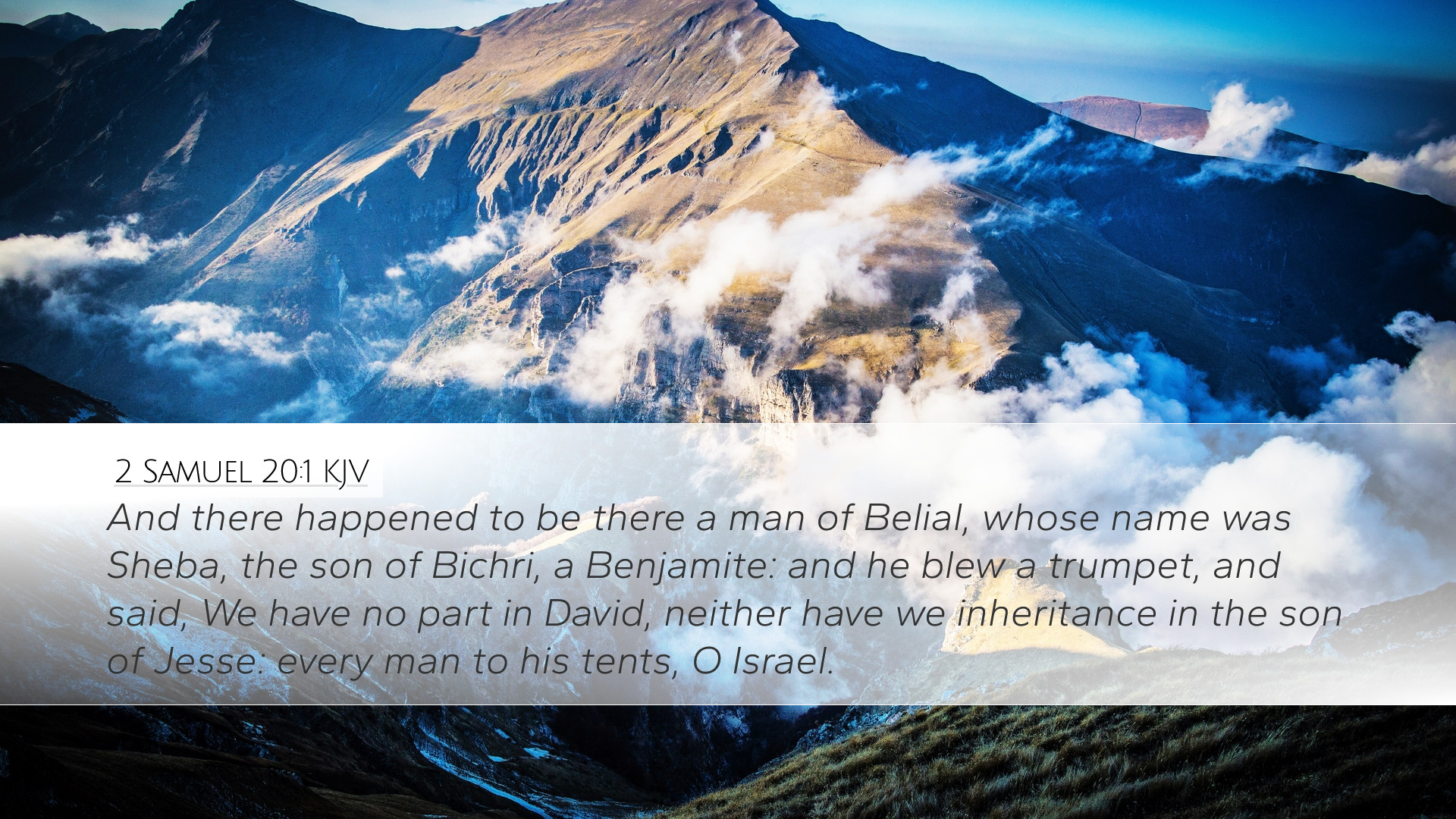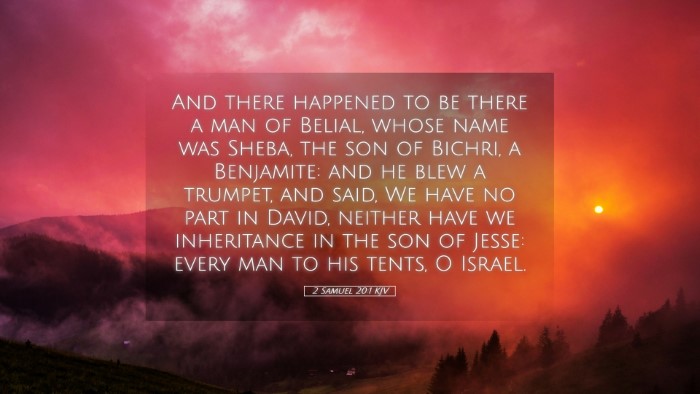Commentary on 2 Samuel 20:1
Verse Text: "And there happened to be there a man of Belial, whose name was Sheba, the son of Bichri, a Benjamite: and he blew a trumpet, and said, We have no part in David, neither have we inheritance in the son of Jesse: every man to his tents, O Israel."
Introduction
This verse marks a significant moment in the narrative of 2 Samuel, highlighting the division within the nation of Israel following the death of Absalom. The emergence of Sheba, a Benjamite, as a leader of a rebellion against David demonstrates the fragility of David's kingship and the ongoing tensions within the tribes of Israel. This commentary draws from public domain sources such as Matthew Henry, Albert Barnes, and Adam Clarke to provide a comprehensive exploration of this verse.
Contextual Background
The period following Absalom's rebellion represents a tumultuous time for King David. Despite his efforts to reconcile, discontent arises among various factions. The mention of Sheba, a man of Belial, indicates a nefarious character whose actions contribute to this unrest. Understanding the sociopolitical climate of ancient Israel helps elucidate the implications of his actions.
Character of Sheba
Matthew Henry cites Sheba as a "man of Belial," which denotes a wicked and worthless individual. His origin as a Benjamite connects him to the tribe that historically had a contentious relationship with David, signifying that Sheba's rebellion is not merely personal but rooted in tribal loyalty and political division.
Albert Barnes elaborates on the significance of Sheba's rebellion in the broader context of David's reign. Sheba's actions provoke an immediate response from the people, showcasing the volatility of the political landscape during this epoch.
Analysis of the Text
Blowing the Trumpet
Sheba's act of blowing a trumpet serves as a rallying cry. According to Adam Clarke, this action symbolizes the call for secession and represents a deliberate challenge to David's authority. The trumpet, usually associated with gatherings for worship or war, here indicates rebellion and a schism among the tribes.
Words of Division
Sheba's proclamation, "We have no part in David, neither have we inheritance in the son of Jesse," reflects a larger sentiment of discontent. This phrase underscores the emotional state of certain factions within Israel who feel marginalized under David's rule.
- Identity and Inclusion: The term "David" and "the son of Jesse" recalls David's humble beginnings and highlights the disconnect felt by those who rally against him. The rejection of David is not merely political but deeply personal, stemming from feelings of exclusion.
- Call to Action: The phrase "every man to his tents, O Israel" is significant; it is a call to return to tribal affiliations and suggests a retraction from unifying national sentiments. This reflects a desire for autonomy and the assertion of tribal identities over national unity.
Theological Implications
This verse, while historical, raises profound theological questions regarding leadership, loyalty, and the nature of rebellion against divinely appointed authority. It invites examination of God's sovereignty in the midst of human strife and division.
Leadership and Sovereignty
Matthew Henry posits that God, while sovereign, often lets sinful leaders rise to reveal the hearts of the people. Sheba's ascent illustrates the dangers of disloyalty and the consequences that can ensue when personal ambition overshadows reverence for God's chosen leader.
Human Discontent
Albert Barnes provides insight into the perpetual nature of human discontent. The rebellion led by Sheba is emblematic of a larger struggle within humanity—a longing for autonomy that can often lead to chaos and division.
Application for Today's Believers
The lessons drawn from 2 Samuel 20:1 are relevant for contemporary believers, leaders, and theologians. The themes of allegiance, unity, and fidelity to God's appointed leadership challenge us to reflect on our commitment to Christ and the unity of the body of believers.
Unity in the Body of Christ
Pastors and church leaders should heed the warning found in Sheba's rebellion. Just as ancient Israel experienced division, so too can the modern church falter when individuals prioritize personal agendas over communal mission. Maintaining unity requires a commitment to Christ's teachings and humility before God's divine structure for leadership.
Discernment in Leadership
The emergence of dissenting voices calls for discernment. Leadership, especially in spiritual contexts, demands awareness of the emotional and spiritual climates of communities. Leaders must be vigilant to reconcile differences and prevent schism through Christ-like humility and wisdom.
Conclusion
2 Samuel 20:1 serves as a vivid portrayal of the complexities of leadership and the challenges of maintaining unity in the face of rebellion and dissent. By examining the character of Sheba and the implications of his actions, we gain a richer understanding of the historical context while also drawing applicable lessons for our own lives and communities today. The combined insights from Matthew Henry, Albert Barnes, and Adam Clarke encourage both reflection and action as we navigate our own faith journeys in a world that often mirrors the divisions faced in ancient Israel.


